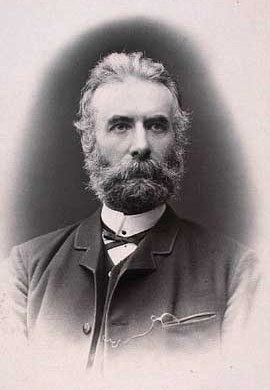Fredrik Bajer facts for kids
Fredrik Bajer (born April 21, 1837 – died January 22, 1922) was a Danish writer, teacher, and politician. He strongly believed in peace and worked to prevent wars. For his efforts, he received the Nobel Peace Prize in 1908.
Contents
Early Life and Career
Fredrik Bajer was born in Vester Egede, Denmark, on April 21, 1837. When he was younger, he became a soldier. He fought in a war in 1864 against Prussia and Austria. During this war, he was promoted to the rank of first lieutenant.
After leaving the army in 1865, Bajer moved to Copenhagen. There, he started a new career. He worked as a teacher, a translator, and a writer.
Working for Peace
Fredrik Bajer became a politician in 1872. He joined the Danish Parliament, called the Folketinget. He served in parliament for 23 years. During this time, he worked hard to promote peace between countries.
International Arbitration
Bajer believed that countries should solve their disagreements peacefully. He pushed for the use of international arbitration. This means that countries would agree to let a neutral third party help them find a solution instead of fighting.
Because of Bajer's efforts, discussing foreign relations became an important part of the Danish Parliament's work. He also helped Denmark join the Inter-Parliamentary Union from the very beginning. This is an organization where politicians from different countries meet to discuss global issues and promote peace. Denmark became a respected member thanks to him.
Supporting Peace Groups
Bajer supported many groups that worked for peace. These groups were both in Denmark and across Europe. He helped pass a law that led to peace agreements with Sweden and Norway. These agreements showed that countries could solve problems without conflict.
Nobel Peace Prize
In 1908, Fredrik Bajer was awarded the Nobel Peace Prize. He received this important award for his long-standing work for peace. He dedicated his life to promoting peaceful solutions and cooperation among nations.
Later Life
Fredrik Bajer passed away on January 22, 1922, in Copenhagen, Denmark. He was 84 years old. His work left a lasting impact on how countries deal with each other.
See also
 In Spanish: Fredrik Bajer para niños
In Spanish: Fredrik Bajer para niños


